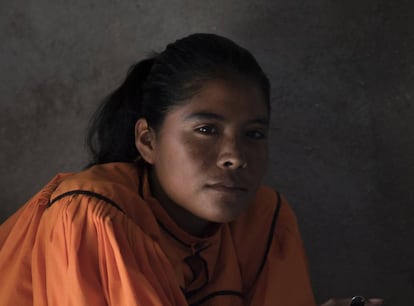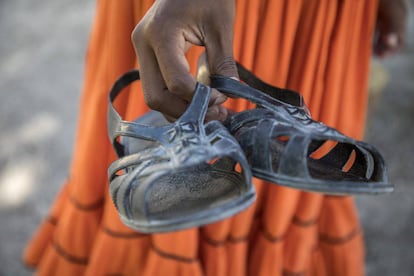Secrets of the Mexican ultra-marathon runner who competes in sandals
Lorena Ramírez is the first member of her community to compete in Europe, but was unable to finish the Canaries Tenerife Bluetrail

In April, 22-year-old Lorena Ramírez, a member of Mexico’s indigenous Rarámuri, also known as Tarahumara, won a 50-kilometer ultra-marathon in Tlatlauquitepec, in the central Mexican state of Puebla, wearing a skirt and traditional huarache sandals.
Her feat made headlines and was widely reported on social networks. As a result, she and her brother were invited to take part in Spain’s grueling Tenerife Bluetrail race, in the 97-kilometer Ultra category, held on June 10, making her the first Rarámuri woman to take part in a European ultra-marathon. In the event, Lorena was unable to finish the race and had to be evacuated by helicopter after she injured her ankle.
Less than a week before leaving Mexico for the first time, she and her brother talked to Verne from their home in Rejogochi, a community in the mountains of Mexico’s Sierra Madre, in the northern state of Chihuahua.
Given that Lorena barely speaks Spanish, her brother Mario does most of the talking. “We are going to train to make you stronger, because there are mixed-race women who are good at running,” he tells her. That said, Rarámuri runners tend not to follow formal training schedules ahead of ultra-marathons.

Lucrecia’s routine includes long trails and climbs through the steep canyons of the Tarahumara mountains. The siblings say they remember as children walking for up to six hours a day looking after their family’s goats or going with their father to the nearest village to buy food. As a result, Lorena has been among the first to cross the finishing line in the internationally known Barrancas del Cobre race.
She came third in the 2016, 80-kilometer Caballo Blanco ultra-marathon, a year after finishing fourth in the 100-kilometer Cañones ultra-marathon, both in the Barranco de Cobre region of Chihuahua.
Lorena estimates she has run some 15 ultra-marathons since she began competing at the age of 17, and always in huaraches, which she says are lighter and have better grip than running shoes.

This is the hottest time of the year in the mountains of Chihuahua, and will last until the rains in September. Under a midday sun and with only an instant coffee in her stomach, Lorena sets out with her brother, two journalists, and Iliana Martínez, the head of the sports department in the nearby town of Guachochi, along some of the trails she covers during her occasional training sessions. She takes the lead, followed by her dog, Perla.
Like many other members of the Tarahumara community, Lorena and her family make their livelihood from running. Neither she or her brother have full-time jobs, and like her father or two sisters, when she comes among the top three in a race, she shares the prize money out with the family. This practice of mutual help, known as kórima, lies at the heart of Rarámuri life.
Lorena uses part of the €300 she won in the Puebla ultra-marathon to help her parents, and will spend the remainder on buying food for the family, whose diet largely consists of frijol beans and pinole, a maize flour mixed with water that is eaten during races. The family also eats nopal cactus and quelite, a wild herb cooked with onion.

During the two-hour run, the group struggles to keep up with Lorena, who soon slows down and allows us a number of rests. Eventually, we reach a summit and are rewarded with spectacular views across the Barrancas del Cobre, some of the deepest canyons in Mexico.
Lorena says little throughout the day: she answers questions with difficulty, relaxing only when asked about her dress, which she made herself, buying only the braiding on her belt, known in Rarámuri as pula.
Mario explains that words count for little and that running is about the feet, not the mind. At the same time, he admits he spends a lot of time recently thinking about how to help support his family. Lorena adds simply that she is grateful as she approaches the finishing line and is among the first to cross. “Winning” is the only thing on her mind.
English version by Nick Lyne.
Tu suscripción se está usando en otro dispositivo
¿Quieres añadir otro usuario a tu suscripción?
Si continúas leyendo en este dispositivo, no se podrá leer en el otro.
FlechaTu suscripción se está usando en otro dispositivo y solo puedes acceder a EL PAÍS desde un dispositivo a la vez.
Si quieres compartir tu cuenta, cambia tu suscripción a la modalidad Premium, así podrás añadir otro usuario. Cada uno accederá con su propia cuenta de email, lo que os permitirá personalizar vuestra experiencia en EL PAÍS.
¿Tienes una suscripción de empresa? Accede aquí para contratar más cuentas.
En el caso de no saber quién está usando tu cuenta, te recomendamos cambiar tu contraseña aquí.
Si decides continuar compartiendo tu cuenta, este mensaje se mostrará en tu dispositivo y en el de la otra persona que está usando tu cuenta de forma indefinida, afectando a tu experiencia de lectura. Puedes consultar aquí los términos y condiciones de la suscripción digital.








































